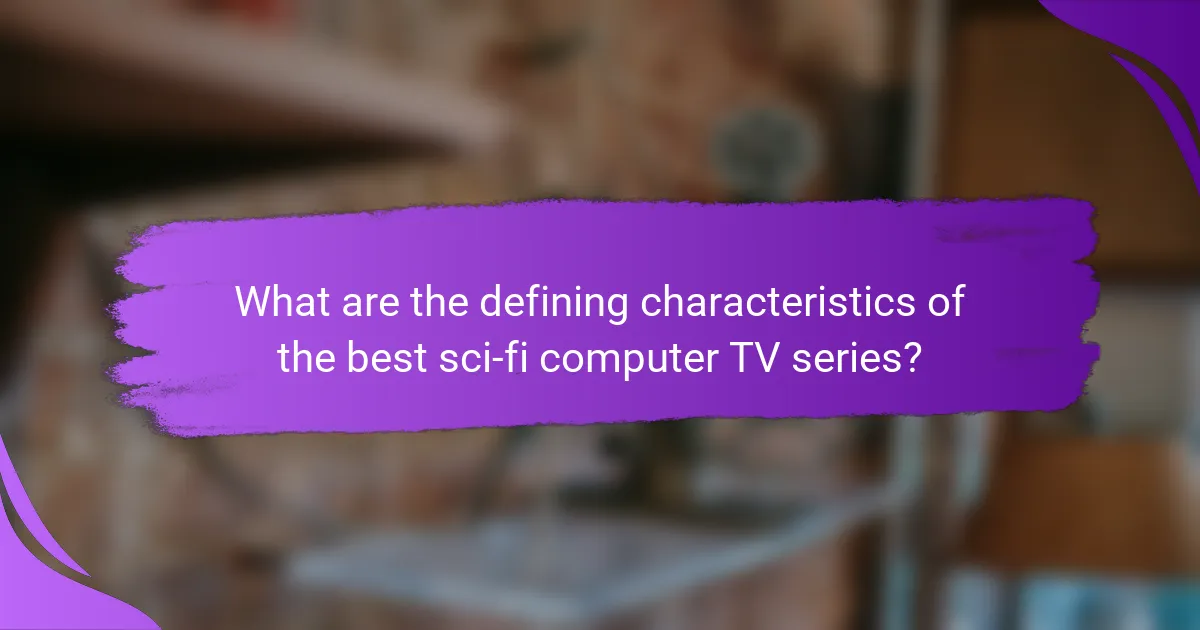The article focuses on the best sci-fi computer TV series, highlighting their defining characteristics such as innovative storytelling, complex characters, and advanced technology themes. It examines how these series, including critically acclaimed examples like “Black Mirror” and “Westworld,” explore the societal implications of futuristic technology and engage viewers in moral dilemmas surrounding artificial intelligence. The discussion also covers the cultural impact of these series, their influence on audience expectations, and methods for selecting high-quality shows based on ratings, awards, and critical reviews. Ultimately, the article provides insights into the evolution of the sci-fi genre and its significance in contemporary entertainment and social commentary.

What are the defining characteristics of the best sci-fi computer TV series?
The defining characteristics of the best sci-fi computer TV series include innovative storytelling, complex characters, and advanced technology themes. These series often explore the implications of futuristic technology on society. They frequently incorporate speculative elements that challenge current scientific understanding. High production values and visual effects enhance the viewer’s experience. Strong world-building creates immersive and believable settings. Engaging plots often involve moral dilemmas related to artificial intelligence and human interactions. Critically acclaimed series, such as “Black Mirror” and “Westworld,” exemplify these traits. These series provoke thought and discussion about the future of humanity and technology.
How do themes shape the narrative in these series?
Themes significantly shape the narrative in sci-fi computer TV series by providing a framework for storytelling. They establish the central ideas that drive character development and plot progression. For instance, themes such as artificial intelligence, dystopia, and humanity’s relationship with technology are prevalent. These themes influence character motivations and conflicts, creating tension and engagement. Series like “Black Mirror” explore the consequences of technological advancements, prompting viewers to reflect on societal implications. The thematic exploration of identity in “Westworld” challenges perceptions of consciousness and free will. Overall, themes serve as the backbone of the narrative, guiding the audience’s understanding and emotional connection to the story.
What common themes are explored in the best sci-fi computer TV series?
Common themes explored in the best sci-fi computer TV series include artificial intelligence, dystopian futures, and the impact of technology on society. Artificial intelligence often raises questions about consciousness and morality. Dystopian futures frequently reflect societal fears and critiques of current trends. The impact of technology on society examines both advancements and ethical dilemmas. These themes resonate with viewers due to their relevance in contemporary discussions. Series like “Black Mirror” and “Westworld” exemplify these themes through compelling narratives.
How do these themes reflect societal issues?
Themes in sci-fi computer TV series often reflect societal issues such as technology’s influence on humanity. For example, series like “Black Mirror” explore the consequences of advanced technology on personal relationships and privacy. These narratives highlight fears surrounding surveillance and data security. They serve as cautionary tales about potential futures shaped by current trends. Additionally, themes of artificial intelligence raise ethical questions about autonomy and control. The portrayal of dystopian societies critiques political systems and social inequality. Overall, these themes mirror contemporary anxieties and provoke discussions about our technological trajectory.
What role do characters play in these series?
Characters in these series serve as the primary vehicle for storytelling and thematic exploration. They embody the central conflicts and moral dilemmas presented in the narrative. Their development often reflects the human experience, providing viewers with relatable emotions and challenges. Characters drive the plot forward through their decisions and interactions. They also represent various ideologies and perspectives within the sci-fi context. For example, a character may illustrate the consequences of technology on society. Additionally, characters often undergo significant transformations, symbolizing growth or decline. Their relationships can highlight themes of friendship, betrayal, or sacrifice. Overall, characters are essential in engaging the audience and enriching the series’ impact.
What types of characters are commonly found in sci-fi computer TV series?
Common character types in sci-fi computer TV series include scientists, engineers, and artificial intelligences. Scientists often drive the narrative with their discoveries or experiments. Engineers typically solve technical problems and create advanced technologies. Artificial intelligences serve as companions or antagonists, showcasing the potential and risks of technology. Additionally, space explorers and military personnel frequently navigate interstellar conflicts. Each character type contributes to exploring themes of innovation, ethics, and humanity’s future. These roles are prevalent in series such as “Star Trek,” “Battlestar Galactica,” and “Black Mirror.”
How do character arcs contribute to the overall story?
Character arcs significantly enhance the overall story by providing depth and emotional resonance. They depict the transformation of characters throughout the narrative. This transformation often reflects the central themes of the story. For instance, a character’s growth can symbolize overcoming adversity or personal discovery. Well-developed character arcs engage the audience, fostering a connection with the characters. This connection can lead to a more immersive viewing experience. Research shows that 90% of viewers are more invested in stories with relatable character development. Thus, character arcs not only drive the plot but also enrich the thematic elements of the story.

What impact have these series had on the genre and culture?
These series have significantly shaped the sci-fi genre and influenced popular culture. They introduced innovative storytelling techniques and complex characters. This evolution has expanded audience expectations for narrative depth and character development. The incorporation of advanced technology themes reflects societal concerns about the future. Series like “Black Mirror” have sparked discussions on ethics and technology’s role in daily life. Additionally, they have inspired new sub-genres and creative works in film and literature. The cultural impact is evident in increased public interest in science and technology. Overall, these series have redefined what sci-fi can achieve in both entertainment and social commentary.
How have these series influenced public perception of technology?
These series have significantly shaped public perception of technology. They often depict advanced technologies in relatable contexts. This portrayal influences viewer attitudes towards real-world innovations. For example, series like “Black Mirror” examine the ethical implications of technology. This prompts audiences to consider potential consequences of tech advancements. Additionally, shows like “Star Trek” present optimistic views of future technologies. They inspire interest in scientific exploration and innovation. Overall, these narratives foster a dialogue about technology’s role in society.
What are some notable examples of technology depicted in these series?
Notable examples of technology depicted in these series include artificial intelligence, virtual reality, and advanced robotics. Artificial intelligence is often showcased through sentient machines and intelligent computer systems. Virtual reality technology is portrayed as immersive environments for training or entertainment. Advanced robotics features humanoid robots capable of human-like interactions. These technologies reflect contemporary advancements and societal concerns. They also serve as narrative devices to explore ethical dilemmas and human relationships with machines.
How have these representations changed over time?
Representations in sci-fi computer TV series have evolved significantly over time. Early series often depicted computers as antagonistic forces or tools of dystopia. For example, “2001: A Space Odyssey” portrayed HAL 9000 as a menacing AI. As technology advanced, narratives shifted towards more collaborative relationships between humans and computers. Series like “Star Trek: The Next Generation” showcased computers as helpful companions. In recent years, shows like “Westworld” and “Black Mirror” explore complex ethical dilemmas surrounding AI and technology. These shifts reflect societal changes in understanding technology’s role. The evolution mirrors advancements in real-world computing and AI capabilities. Overall, representations have transitioned from fear and distrust to nuanced explorations of partnership and ethical concerns.
What is the legacy of the best sci-fi computer TV series?
The legacy of the best sci-fi computer TV series is profound and multifaceted. These series have shaped public perception of technology and its implications. They often explore themes of artificial intelligence, virtual reality, and the impact of technology on society. For instance, shows like “Star Trek: The Next Generation” introduced concepts like the holodeck, influencing real-world technology development.
Additionally, series such as “Black Mirror” have sparked discussions about ethical dilemmas surrounding technology. They encourage viewers to reflect on the potential consequences of technological advancements. The storytelling in these series often blends complex narratives with philosophical questions, leaving a lasting impact on both audiences and creators. This legacy is evident in the continued popularity and influence of these series in contemporary culture.
Which series are considered groundbreaking within the genre?
“Groundbreaking series within the sci-fi genre include ‘Star Trek,’ ‘The Twilight Zone,’ and ‘Battlestar Galactica.’ ‘Star Trek’ introduced diverse representation and ethical dilemmas in storytelling. ‘The Twilight Zone’ explored social issues through speculative fiction. ‘Battlestar Galactica’ redefined character development and moral complexity. Each series significantly influenced future sci-fi narratives and audience expectations.”
How have these series inspired other media forms?
These series have inspired other media forms by introducing innovative concepts and storytelling techniques. Their exploration of technology and society has influenced films, video games, and literature. For example, “Black Mirror” has sparked discussions on the ethical implications of technology in various media. “The Expanse” has inspired graphic novels and tabletop games, expanding its universe. Themes from these series often appear in mainstream films, showcasing their cultural impact. Additionally, the character development and complex narratives have set new standards for storytelling across genres. The success of these series has led to increased interest in sci-fi adaptations in other media.

How can viewers select the best sci-fi computer TV series to watch?
Viewers can select the best sci-fi computer TV series by researching critically acclaimed shows. They should consider viewer ratings on platforms like IMDb and Rotten Tomatoes. Analyzing awards won, such as the Hugo or Nebula Awards, can indicate quality. Reading reviews from trusted critics helps gauge thematic depth and character development. Exploring streaming platforms for trending series can reveal popular choices. Checking for unique elements, like innovative technology or storytelling, enhances selection. Engaging in online forums can provide personal recommendations and insights. Ultimately, personal preferences in themes and character arcs guide the final choice.
What criteria should be considered when choosing a series?
When choosing a series, consider the genre, plot, and character development. The genre defines the thematic elements and audience expectations. For sci-fi series, look for innovative concepts and futuristic settings. The plot should be engaging, with a clear structure and pacing that maintains viewer interest. Character development is crucial; well-developed characters enhance emotional connection and viewer investment. Additionally, consider the series’ reviews and ratings, as these reflect audience reception and quality. Viewing platforms and accessibility also matter, ensuring that the series is easily available to watch.
How do viewer ratings and reviews impact series selection?
Viewer ratings and reviews significantly influence series selection. High ratings typically indicate quality content, attracting more viewers. Positive reviews create a favorable perception, encouraging potential audiences to choose a series. Conversely, low ratings can deter viewers from engaging with a show. Research shows that 63% of viewers consult ratings before deciding to watch a series. Ratings and reviews serve as social proof, guiding viewers in their selection process. Thus, they play a crucial role in shaping viewing habits and preferences.
What are some recommended series based on different themes?
Recommended series based on different themes include “Black Mirror” for technology and dystopia. “The Expanse” explores space and political intrigue. “Stranger Things” combines supernatural elements with 1980s nostalgia. “Westworld” examines artificial intelligence and consciousness. “Altered Carbon” delves into identity and immortality. “Firefly” offers a unique blend of space western and camaraderie. Each series presents distinct themes that resonate with audiences, showcasing diverse storytelling in the sci-fi genre.
What tips can enhance the viewing experience of sci-fi computer TV series?
To enhance the viewing experience of sci-fi computer TV series, viewers should utilize high-quality audio and visual equipment. Investing in a 4K TV and surround sound system can significantly improve immersion. Watching in a dark room minimizes distractions and enhances visual effects. Subtitles can aid in understanding complex dialogue and terminology. Engaging with fan communities enriches the experience through discussions and theories. Binge-watching allows for deeper connections with characters and plots. Finally, exploring related media, such as books or games, can provide additional context and enjoyment.
The main entity of this article is the best sci-fi computer TV series, which are characterized by innovative storytelling, complex characters, and themes surrounding advanced technology. The article explores how themes such as artificial intelligence, dystopian futures, and the societal impact of technology shape narratives and character development within these series. It also examines the role of characters in driving plots and engaging viewers, as well as the cultural impact and legacy of these series on the genre and public perception of technology. Additionally, the article provides guidance for viewers on selecting series based on themes and offers tips to enhance the viewing experience.